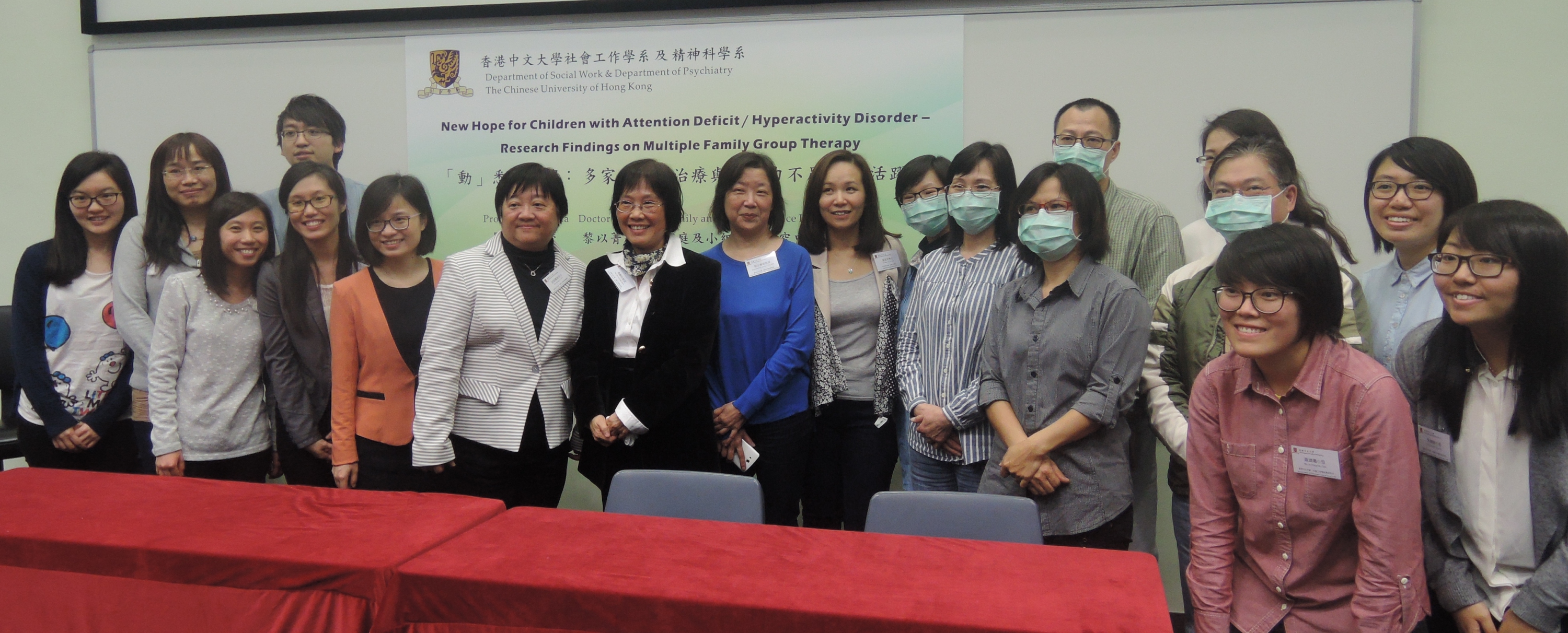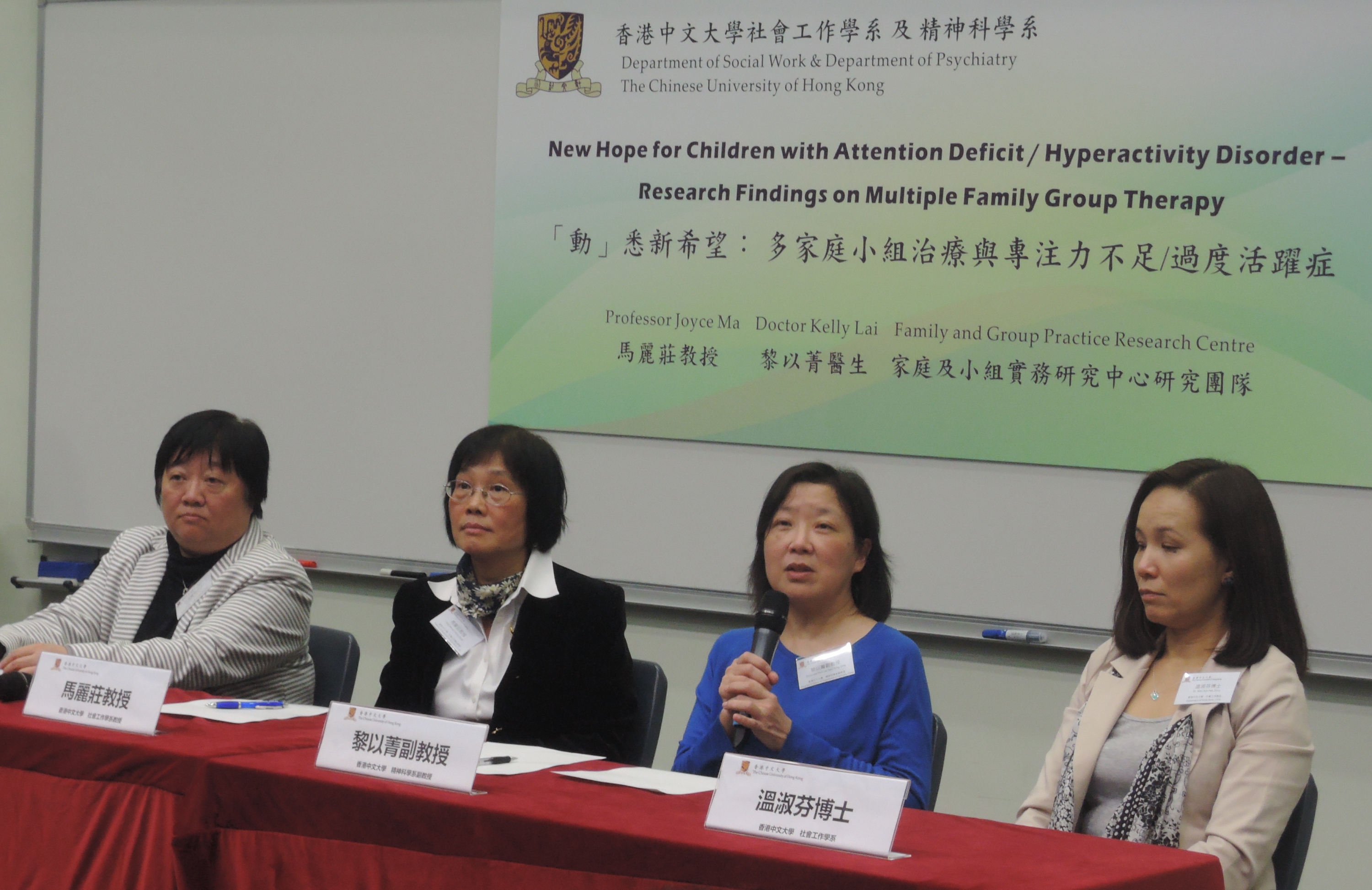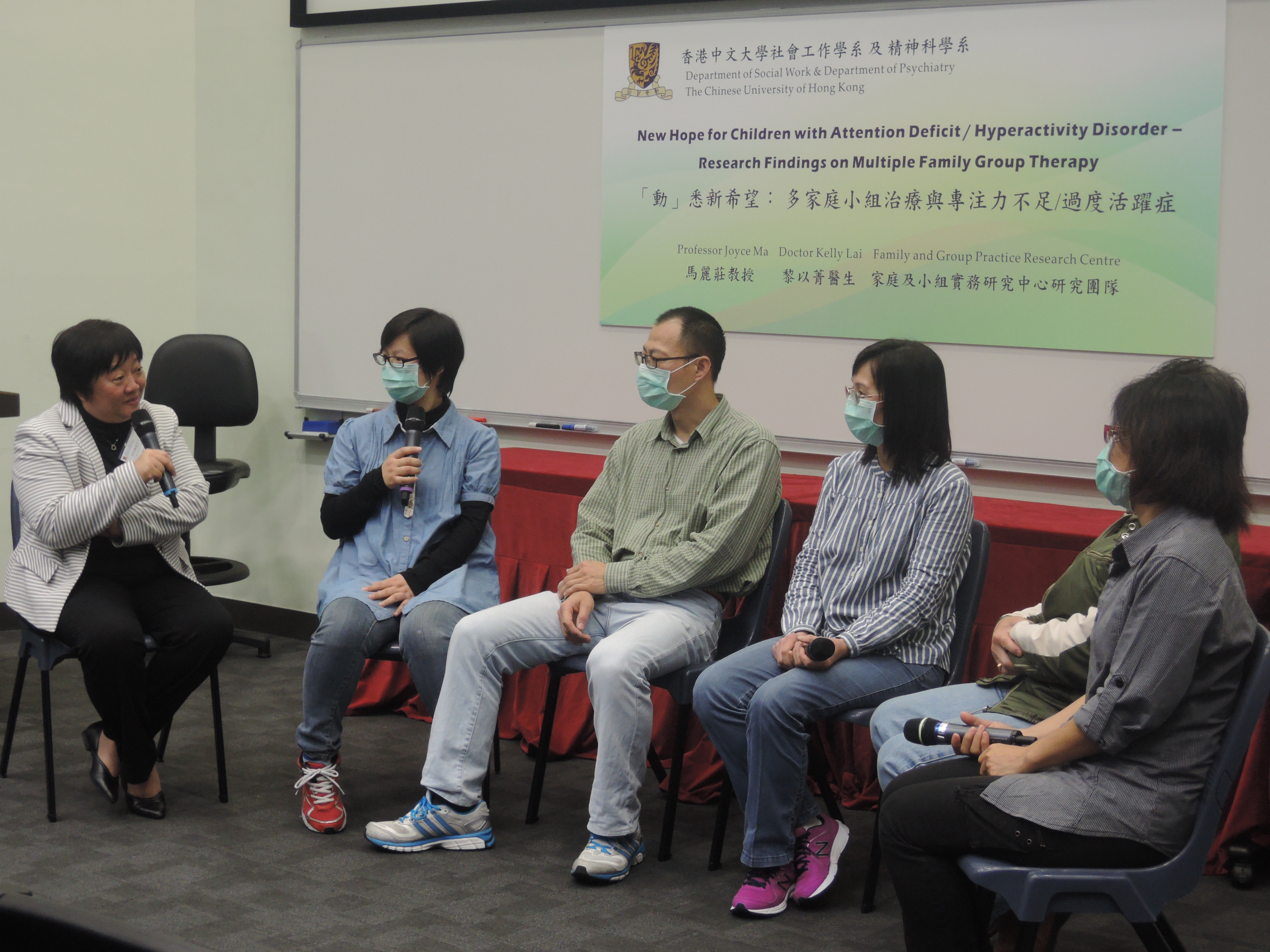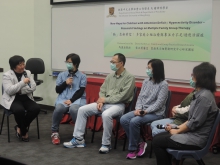CUHK
News Centre
CUHK Social Work and Psychiatry Research Reveals Efficacy of Multiple Family Group Therapy for Children with ADHD and Their Families
Prof. MA Lai-chong of the Department of Social Work and Prof. LAI Yee-ching, Associate Professor of the Department of Psychiatry (Head, Adolescent and Children Psychiatric Centre, Alice Ho Miu Ling Nethersole Hospital) from The Chinese University of Hong Kong (CUHK) have completed a 3-year cross-disciplinary study which aimed to assess the effectiveness of Multiple Family Group Therapy (MFGT) in helping Chinese families of children with Attention Deficit / Hyperactivity Disorder (ADHD). The results of the study indicate the importance of mental health professionals assisting the parents and children to discover and develop children’s potential and talents other than in academic achievement. They are also a reminder of the importance to these families of having more quality family time in general and in particular of improving parent-child relationships and strengthening their supportive network, both formal and informal.
ADHD is a common mental health challenge to children. Its prevalence in Hong Kong among Chinese school-age boys was shown to be 6.1%. When females are included, the proportion of school-aged children affected was shown to be approximately 3-5% (male to female ratio: 4:1). As a developmental disorder defined by the cluster of symptoms comprising inattention or hyperactivity-impulsivity, ADHD has negative impacts on different aspects of children’s development (e.g., learning and emotional regulation) and their interpersonal relationships in multiple contexts, including school, peer, community and family. The mainstream treatment for children with ADHD mainly consists of medication, psychoeducational talk and behavioral therapy for the children and/or their parents. However, many parents still feel powerless and confused even when they have knowledge about ADHD symptoms, the effectiveness and side-effects of medication, and specific parenting skills. It is never easy to put all the knowledge into practice.
Prof. LAI Yee-Ching commented that the mainstream treatment could help to reduce some ADHD symptoms and redress children’s impairment but its deficit orientation renders it impossible to identify children’s talent, reduce their sense of stigmatization and social isolation.
In view of the inadequacy of the mainstream treatment model and the urgent need of these families, Prof. MA Lai-Chong suggested that service to families of children with ADHD should be designed and developed according to their needs and family strengths.
Funded by the Hong Kong Research Grant Council (RGC), Professor Ma and Professor Lai and their research team started a three-year clinical research project in 2013 with the use of MFGT as an intervention for Chinese families of children with ADHD. About 120 families of children (5 to 12 years old) with ADHD were invited to attend this study; 66 of them were included in the experimental group to have MFGT activities, while families of the control group attended psychoeducational talks.
The study results showed that there was no significant change in various aspects of the families in the control group but significant improvement in several aspects for parents of the experimental group was found. 1) Over 70% parents found their children’s behavior improved after joining the MFGT, and the change in their perception of children’s symptoms was significant in the posttreatment phase; 2) about 70% parents perceived social support increased after the MFGT, and 52% of them felt the change was significant; 3) about 60% parents appraised their sense of parental competence more positively after the intervention, with over half of them experiencing significant change. It was also found that parents’ perception of children’s behavior correlated positively with parenting stress while correlating negatively with their sense of parental efficacy, indicating that the more positively the parents viewed their children, the less the parents would feel the stress of parenting, and the more capable would they feel in parenting.
Professor Ma and her research team have previously applied MFGT as an intervention for families with parenting difficulties and children with mental health needs. This is the first time that MFGT has been used in helping children with ADHD and their families. Viewed from a strengths-perspective and with emphasis on intra/inter-family interactions, MFGT brought positive experiences to the participants through their active participation in different group activities. Each group consisted of 5 to 7 families; the content for each group was a pre-group psychoeducational talk (4 hours), four-full-day group activities (32 hours) and two post-group reunion sessions (6 hours). The intervention lasted about 42 hours in total and was completed within 6 months. Examples of group activities include ‘family puppet show’ and ‘family story books’ which aim at improving the parent-child relationship; ‘flying egg’ which increases parents’ appreciation of children’s ability; mindfulness exercises which help parents and children to relax; and partnering up children with members of other families to prepare lunch for the whole group, to provide parents with the opportunity to understand their own children from a new angle.
Both children and parents were highly satisfied (respectively 4.58 and 4.21 out of 5) with the group activities, which were consistent with the above results. One parent participant said: “I used to think there was a special method for parenting children with ADHD. I thought too much and made things too complicated……I thought there were two separate methods. But now, I realize he is just like any other ordinary kid. Things that happen to any ordinary kid happen to him. I mean I felt isolated”.
The children liked the freedom and respect they got from the MFGT. One child compared it with traditional behavioral training like this: “more freedom here……Because those prizes and gifts only push you to work harder, but I like freedom, letting me run around …… I don’t feel like I am being trained like a dog”.
The results of the study remind helping professionals in Hong Kong of the following: helping professionals should assist the parents and children with ADHD to (a) discover and develop children’s potential and talents (e.g., sports, arts and music); (b) spend more quality time with family in general and in particular to improve parent-child relationships (c) foster mutual help and mutual support among families of children with ADHD; and (d) strengthen the intersectoral collaboration among families, school, health care and social service, which in turn would better respond to the multiple service needs of these families.
The research team led by Prof. MA Lai-chong of the Department of Social Work and Prof. LAI Yee-ching, Associate Professor of the Department of Psychiatry, CUHK poses for a group photo with participating parents of Multiple Family Group Therapy (MFGT).
(from left) Mrs. Monica YAU and Prof. MA Lai-chong from the Department of Social Work; Prof. LAI Yee-ching from the Department of Psychiatry; and Dr. Erica Wan from the Department of Social Work, CUHK







